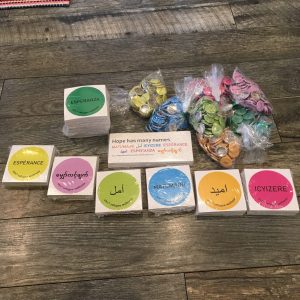I want you to know that I have been doing therapy with some of the bravest, most resilient people on the planet. I want them to know it, too. Celebrating their cultures and strengths is the inspiration for my summer generalist placement project through the UNC School of Social Work. I spent more than three months as a clinical MSW intern at the UNC Refugee Mental Health and Wellness Initiative, a program that offers free and culturally sensitive mental health care to refugees in the Triangle. But first, a basic truth:
“In America, mental health care does not mean someone is crazy. It just means they are working on ways to manage stress and a range of emotions.”
That’s how Beth Farmer, LICSW, MSW, urged us to normalize mental health care with refugee clients. She would know. She’s the program director of Pathways to Wellness and co-creator of the RHS-15 mental health screener for refugees. Not three weeks into my placement did I find myself on a conference call with one of the pioneers of refugee mental health care. Because mental health stigma is a huge issue, especially within this population (Baptiste, 2017; Shannon, Wieling, Simmelink-McCleary & Becher, 2015; The Center for Victims of Torture, 2018) Farmer insisted that before any formal client screening—even before even mentioning informed consent—we take decisive steps to affirm our clients and their experiences, and their decision to talk with us.
“I know that the clients who work with me are not weak people,” she explained. “They are all very strong to have survived. They are also resourceful to find support to reach their goals.”
Of course, I thought. Obviously. Our clients are people who have been forcibly displaced from their homes in the Democratic Republic of Congo, Afghanistan, Syria, and other countries, often because of violence, torture, sexual assault and other human rights abuses. They’ve survived the most severe human traumas, and many have to continue migration for years before they arrive here to resettle. And yet, many of these survivors feel ashamed that they’re asking for help with depression or flashbacks of traumatic events, or racing thoughts while they’re trying to go to sleep. After all they’ve been through, these survivors don’t need the stigma around mental health care holding them back.
care holding them back.
The fact of their meeting with us is evidence that our clients have hope for their future. They’re also proud of their culture, their artwork and fashion, their food, their languages. Our clients’ faces lit up when we learned greetings in their languages. “Muraho!” “Jambo, habari gani?” “As-salamu alaykum.” These languages are distinct and beautiful, and I thought more North Carolinians might like to know more about their refugee neighbors.
I developed the “Hope Has Many Names” outreach campaign for my Master of Social Work agency gift after learning that UNC Refugee Wellness had nothing to distribute from our table at Durham Refugee Day. (It’s not for lack of planning. Every dollar is stretched to make sure Refugee Wellness has enough money to pay for language interpreters to facilitate therapy session, and even that well runs dry.) Rather than printing brochures, I wanted to develop an attractive collection of swag that could serve as a contact-based intervention against mental health stigma within refugee communities and in the general public. (Stuart, 2016 reports that contact-based interventions are a small but promising piece of the effort to dismantle stigma.) Also, despite the broad local discussion about America’s immigration crisis, few North Carolinians are aware that thousands of refugees have been resettled and live in the Triangle.
For this project, I designed seven buttons and eight sticker designs featuring the word “Hope” in seven of the most common languages spoken by our refugees (Arabic, Persian, Burmese, Swahili, Kinyarwanda, Spanish and French), and I secured funding from the Jordan Institute for Families to print them. It is intended to be a culturally affirming celebration of the strength and resilience of our refugee clients, and a conversation starter for people who see these buttons and stickers to ask about them. I have written a companion document, recommending ways that Refugee Wellness can distribute these items to financial donors, clients and the public as a way of raising awareness and language interpretation funding.
My internship at UNC Refugee Wellness has been full of challenging, fascinating and deeply moving experiences. This is an internship for self-starters, especially in the summer. The field instructor and task supervisor are busy educators, advocates and clinicians in their own right. They are culturally and clinically knowledgeable, but they are also truly compassionate and unflaggingly supportive. (See the sidebar/section below to learn more about what I did this summer and what I learned.) This has been a life changing opportunity to pursue meaningful clinical work with some of the most amazing people humankind has to offer.
***************
Things I learned:
- How to engage and treat clients with the help of language interpreters and cultural brokers.
- The basic differences, philosophies and functions of CBT (English and Spanish), DBT (English and Spanish), CPT, ACT, and NET.
- How to complete SOAP notes and develop a biopsychosocial assessment.
- Documentation can be real bummer, but timely record keeping is so, so important.
- That the Triple Trauma Paradigm impacts so many people who come to this country, regardless of legal status.
- That English as a dominant language in American culture is a systemic gatekeeper, which limits access to resources for thousands of people in our country, and prohibits many legal residents from culturally competent mental health care.
- My presentation as a cisgender white woman and an agent of the American clinical establish is received by my clients in many different ways. I need to strive for cultural humility and professional accountability in every encounter.
- Trauma stewardship is both a rewarding and draining business that requires self-care and external support.
References
Baptiste, V.M. (2017). The Impact of Stigma on the Mental Health of Resettled African and Asian Refugees. Graduate College Dissertations and Theses. 785. https://scholarworks.uvm.edu/graddis/785
The Center for Victims of Torture. (2018). Reducing Stigma: a First Ray of Hope. CVT Blog. Retrieved from https://www.cvt.org/blog/healing-and-human-rights/reducing-stigma-first-ray-hope
Shannon, P.J., Wieling, E., Simmelink-McCleary, J. & Becher, E. (2015). Beyond stigma: Barriers to discussing mental health in refugee populations. Journal of Loss & Trauma, 20(3), 281-296. doi:10.1080/15325024.2014.934629
Stuart H. (2016). Reducing the stigma of mental illness. Global Mental Health, 3, 17. doi: 10.1017/gmh.2016.11.
